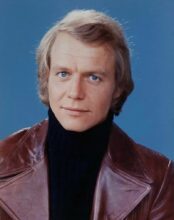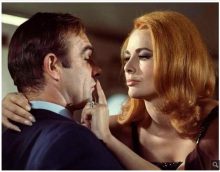On 17 August 2025, British actor Terence Henry Stamp passed away at the age of 87, as confirmed by his family and representatives. His family requested privacy during this time, noting he “leaves behind an extraordinary body of work, both as an actor and as a writer that will continue to touch and inspire people for years to come.”
Terence Stamp was born on 22 July 1938 in Stepney, London, the eldest of five children to Ethel and Thomas Stamp, a tugboat stoker. He endured the harrowing Blitz during World War II and later worked in advertising agencies before earning a scholarship to the Webber Douglas Academy of Dramatic Art in London.
1960s – Breakthrough and Art-house Stardom
– 1962 – Billy Budd: Stamp’s screen debut earned him an Academy Award nomination for Best Supporting Actorand a Golden Globe for Most Promising Newcomer – Male.
– Mid-1960s: He delivered a chilling turn in Pasolini’s Theorem (1968), and starred in The Collector (1965), winning Best Actor at Cannes.
– Far from the Madding Crowd (1967) saw him opposite Julie Christie.
1970s–1980s – Hollywood Blockbusters and Career Lull
– After a quieter period in the early 1970s, Stamp became iconic as General Zod in Superman (1978) and Superman II (1980).
– He re-emerged in the mainstream in supporting roles, such as Sir Lawrence Wildman in Wall Street (1987).
1990s – Rediscovery and LGBTQ Milestone
– 1994 – The Adventures of Priscilla, Queen of the Desert: As Bernadette Bassenger, a transgender woman, Stamp earned Golden Globe, BAFTA, and AFI Award nominations. The role revived his career and earned lasting cultural acclaim.
Late 1990s–2000s – Critical Acclaim & Versatility
– 1999 – The Limey: His role as a vengeful father earned nominations at the Independent Spirit Awards and London Film Critics’ Circle, and he appeared as Chancellor Valorum in Star Wars: Episode I – The Phantom Menace.
– He appeared in high-profile films including Get Smart, Yes Man, Wanted, Valkyrie, The Adjustment Bureau, and Miss Peregrine’s Home for Peculiar Children throughout the 2000s.
2010s–2021 – Later Work and Final Roles
– In the 2010s, Stamp added voices to video games and documentaries, and narrated TV series—work that continues his legacy beyond the screen.
– His final film role was in Edgar Wright’s Last Night in Soho (2021).
Over a career spanning six decades, Stamp’s artistry was recognized widely:
– Academy Award nomination – Billy Budd (1962)
– Golden Globe winner – Most Promising Newcomer – Billy Budd (1963)
– Cannes Film Festival Best Actor – The Collector (mid-1960s)
– Multiple nominations for BAFTA, Golden Globe, AFI Award for Priscilla, Queen of the Desert(1994)
– Independent Spirit Awards and other critical nominations—especially for The Limey.
Stamp’s creative pursuits extended far beyond acting:
– Memoirs and Books: Authored Stamp Album (1987), The Night (a novel), The Stamp Collection Cookbook (co-written), Rare Stamps (ebook), and The Ocean Fell into the Drop (2017).
– Voice Acting & Audio:
– Video games like The Elder Scrolls IV: Oblivion (voice of Mankar Camoran) and Halo 3 (Prophet of Truth)
– Narrated documentaries and audiobooks, including Jazz Britannia, Perfect Brilliant Stillness, History of Football: The Beautiful Game, the World Cup retrospective 1966 – A Nation Remembers, and Only Fools and Horses documentary.
– Public Advocacy: In 2007, he gave a speech on climate change at Wembley Stadium during Live Earth, introducing Madonna.
– Romantic Life and Cultural Status: Stamp was a 1960s style icon, romantically linked to Julie Christie and supermodel Jean Shrimpton, one of Mod London’s most photographed couples.
– Spiritual Journey: After highs in the 60s, he spent time in India as a swami, exploring spirituality.
– Marriage: On New Year’s Eve 2002, at 64, Stamp married Elizabeth O’Rourke (29), an Australian-Singaporean pharmacist; they divorced in 2008.
– Privacy in Philanthropy: Though not widely publicized, his family noted he engaged in charitable efforts discreetly.
Terence Stamp’s life reflects an expansive, impassioned embrace of art, individuality, and reinvention. From his emergence as a poised young newcomer in the 1960s to becoming a beloved villain, a courageous LGBTQ icon, and an audiobook voice on spoilt soils of media, Stamp’s presence was singular. He navigated careers and cultures with unforgettable charisma, calm introspection, and a voice that continued to resonate—whether on screen, on the page, or in our hearts. His passing marks the end of an era, but his body of work ensures his legacy endures.
Stay updated with your free Noise11.com daily music news email alert. Subscribe to Noise11 Music News here
Be the first to see NOISE11.com’s newest interviews and special features on YOUTUBE and updated regularly. See things first SUBSCRIBE here: Noise11 on YouTube SUBSCRIBE
Noise11.com
Follow us at https://bsky.app/profile/noise11.bsky.social
Noise11 on Instagram
Comment on the news of the day, join Noise11 on Facebook

















